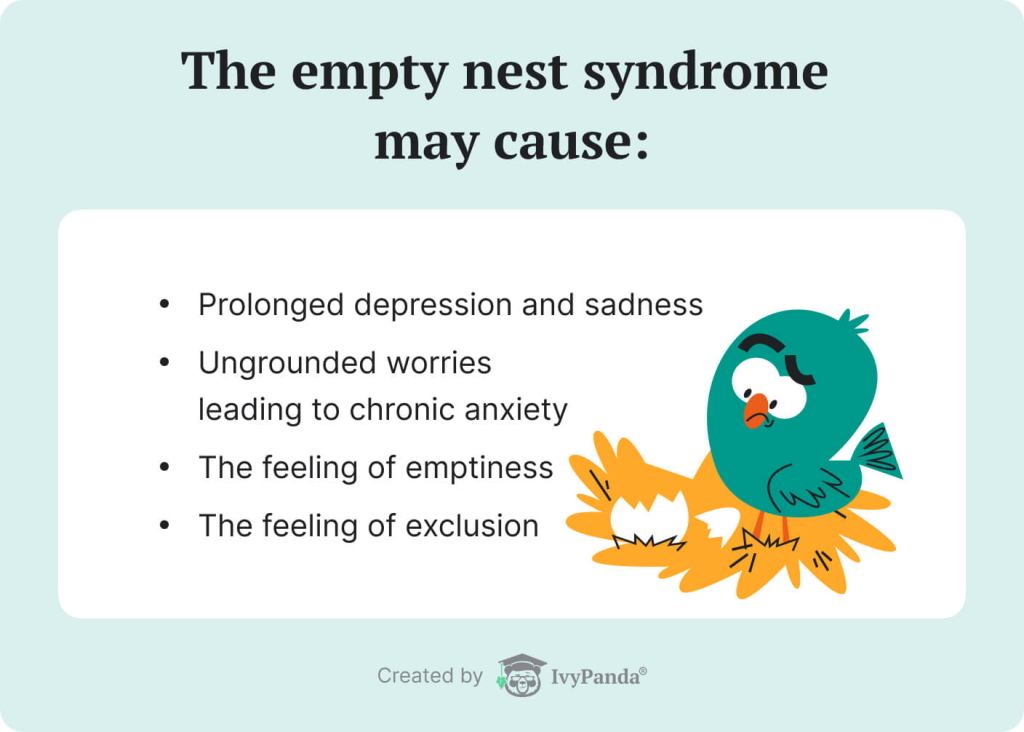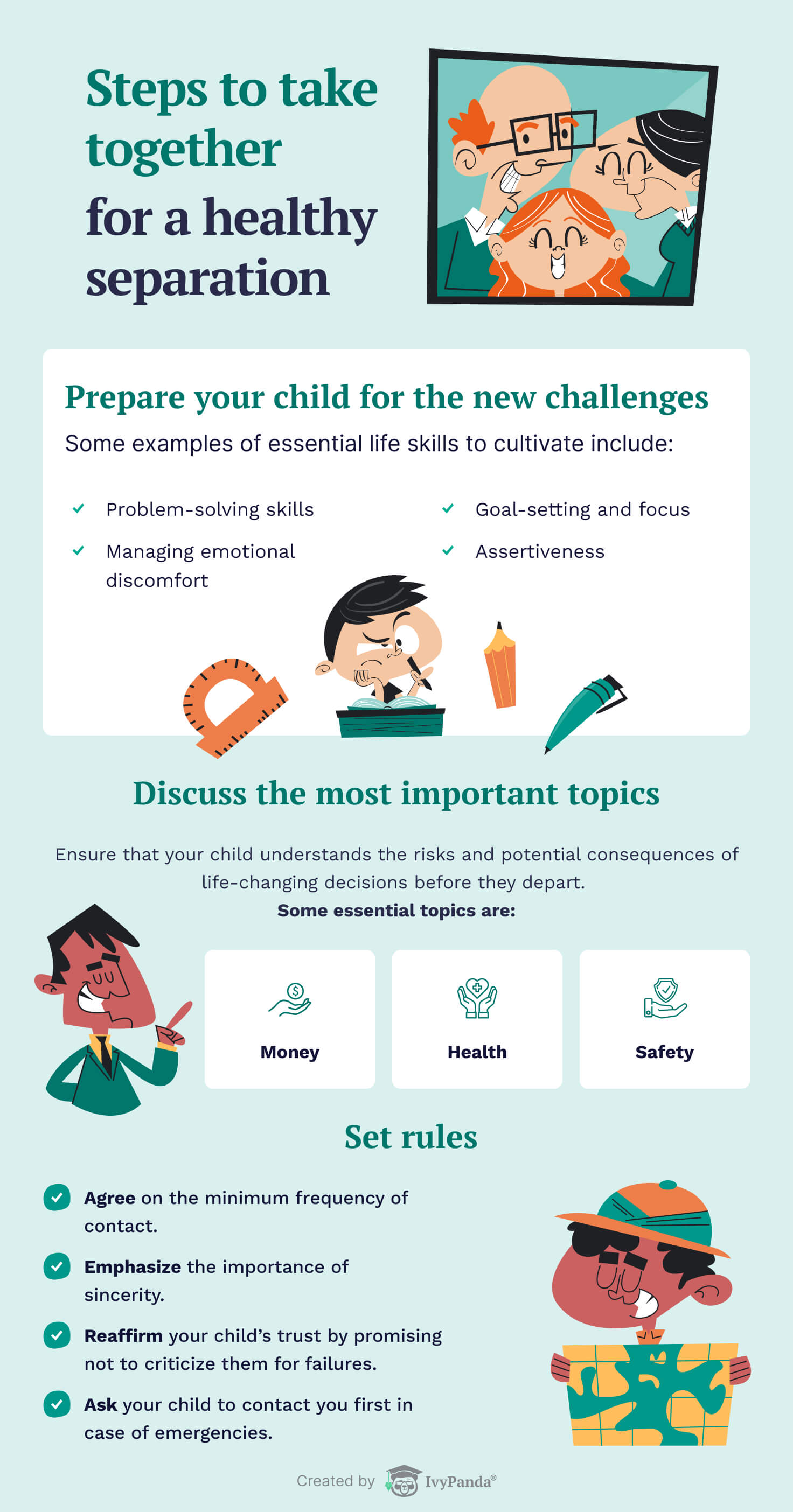No matter how diligently you prepare for life changes like college enrollment, you’ll never feel fully prepared. Transitioning to life as an independent adult away from family is always challenging.
For students, it’s the beginning of a new life stage, filled with tons of new information, acquaintances, routines, and lifestyle changes. Meanwhile, parents risk developing ‘empty nest’ syndrome – the sense of emptiness after their child leaves home.

If you’re approaching this change with apprehension, read on for practical tips on managing stress and ensuring a smooth transition.
🪹 How It Feels When Kids Go to College
A child’s departure from the family home to a college campus can evoke a range of emotions and concerns in parents. The intensity of these feelings and worries depends on many factors, such as the history of family relationships, parental temperament, and style.
However, the experience of empty nest syndrome is a common thread among parents, albeit to differing degrees. This condition manifests as grief over separation and the loss of a close connection between parents and children due to physical distance. Mothers, typically serving as the primary caregivers, often feel particularly vulnerable to the emotional impact of an empty nest.
Although the empty nest syndrome resembles a depressive episode marked by loss and grieving, it is often downplayed or overlooked compared to more overt forms of loss, such as the death of a family member. Nevertheless, it represents a serious mental health challenge that should be recognized and adequately addressed. Challenges associated with this syndrome may include:
- Prolonged depression and sadness. As negative emotions and the sense of losing the familiar lifestyle accumulate without proper management, they can escalate into depression.
- Ungrounded worries leading to chronic anxiety. When children remain with their parents, they are under close control and guidance. After leaving their family homes, they start an independent adult life that their parents cannot control. Parents may experience ongoing concerns about their children’s well-being and ability to make responsible decisions. Especially in the face of potential risks like alcohol, drugs, and unsafe relationships commonly associated with college life.
- The feeling of emptiness. The lingering feeling of a ‘void’ that forms after the child’s departure may be traumatic for parents, especially those accustomed to full-time involvement in their children’s upbringing.
- The feeling of exclusion. The parent’s role changes as the offspring moves out. Parents transition from acting as constant guardians to occasional friends and advisors. Not everyone is ready for that shift in roles, which can lead to feeling left out of their child’s life progress.

How It Feels for Kids Themselves
While much attention is given to the parents’ emotions, teenagers’ perspectives are equally significant during the transition to college and the evolution of parent-child relationships. Students face a host of challenges upon enrollment:
🧘 Part I: Transition to College for Parents – Preparation
The best remedy for the stress surrounding college preparation is to get ready early. Parents are the primary source of their kids’ resilience, so they should participate in the process and support their growing children in any way they can. Here’s what you can do.
- Accept your sadness. The first thing to do is to understand that feeling sad and grieving is a normal part of the transition. Don’t try to hide your feelings or put on a happy face when you feel bad; the repressed emotions may eventually escalate into depression.
- Avoid over-planning. While it’s important to prepare, don’t overwhelm yourself with extensive planning. Trust that things will unfold naturally.
- Understand your new role. Many parents feel anxious because they perceive their child’s relocation as a trauma. Instead, accept that your role as a parent is evolving. Embrace the new tasks, responsibilities, and challenges to function well in your new position.
- Prepare for new scenarios. Healthy planning may help you and your child avoid the stress of uncertainty. Discuss the possible scenarios with your kid to ensure they are prepared for challenges, such as falling ill, missing a class, meeting a dangerous stranger, etc.
- Foster connection. The best way to cope with separation is to stay connected. Set a schedule for calls and create a family group chat to exchange photos and current news. These small steps will help you overcome loneliness even when long distances separate you from your kids.
🔎 Part II: Transition to College for Parents – Implementation
Your child has left the family nest, and you feel lonely and abandoned…
How can you navigate this period of acute stress and begin to heal?
Here are a few tips to help you restore balance to your disrupted routines and find your way back to normalcy.
- Embrace the change. Recognize that the adjustment period varies for everyone, so allow yourself the time to adapt to the new situation and a new home atmosphere. Don’t rush the process; healing takes time.
- Explore new hobbies and interests. Parents often neglect their passions while raising children. Take this opportunity to go on a trip, read the books you’ve been meaning to read, join a sports club, or more – your options are limitless. It is also a good time to find your Ikigai
- Concentrate on what you can control. While you may no longer have immediate control over your children, you can redirect your attention to areas where you have agency. Pay attention to your family pets, nurture your friendships, and tend to your garden. These aspects of your life are still within your control.
- Seek support if needed. If you find yourself struggling to cope with negative emotions, it’s time to talk to a therapist. Navigating this challenging transition with professional support can be very beneficial.
- Make sure your child has enough supportive resources. Inquire about medical facilities, nutritional assistance, and any other resources they may need while far from home. This step is especially important for children with disabilities.
- Adapt your approach to your child. As children leave their parents’ houses to start a new life, they turn into young adults and require a different attitude from their parents. Your task is to shift from a parent-child dynamic to an adult-adult relationship.
- Be understanding and supportive. We all make mistakes, and your kid will inevitably make their own. Accept this process as a part of their journey of self-discovery.
👪 Steps to Take Together for a Healthy Separation
Now that we understand how parents should prepare for separation, let’s focus on the students. What can a college newcomer do alongside their parents to ensure a smooth transition? Here are several options to consider as a family.

Prepare Your Child for New Challenges
Psychological readiness for an independent adult life is crucial for a student’s success in college. Therefore, it’s essential for parents to equip their children with the skills needed to navigate various challenges and risks they may encounter in their new environment. Some examples of essential life skills to cultivate include:
- Problem-solving. Transitioning to college means entering a new social sphere where students encounter diverse people and situations. Not all experiences will be positive, and making missteps may cause emotional distress and strain relationships. Thus, problem-solving skills are crucial for navigating a new atmosphere.
- Managing emotional discomfort. While academic preparedness is important, emotional resilience is equally – if not more – critical for college success. Students face daily frustrations, stressors, and conflicts, making it essential to develop healthy coping mechanisms and emotional regulation strategies to thrive in the dynamic college environment.
- Goal-setting and focus. Setting goals provides purpose to college life beyond academics. To focus on these goals, it is fundamental to assess successes and setbacks with a broader perspective. Having this skill developed, students will achieve realistic self-perception and personal growth.
- Assertiveness. College presents countless situations in which students must defend their position and advocate for their interests. Thus, it’s important to teach your offspring to recognize the violation of their boundaries and to defend their rights constructively.
Discuss the Most Important Topics
As children leave the family home, they will encounter many adult challenges without anyone by their side to advise or support them. Therefore, it’s essential to ensure that your child understands the risks and potential consequences of life-changing decisions before they depart. These topics include:
- Managing money wisely.
- Taking care of their health.
- Always prioritizing safety, especially in situations involving alcohol, drugs, or unsafe sex.
Set Rules
Freedom comes with inherent risks, and trust is crucial for successfully navigating life changes. Establishing rules can give you and your child a roadmap of expectations for this new phase of life. What kinds of rules can help you manage the transition?
- Agree on the minimum frequency of contact – e.g., they should call you every three days (or more/less often).
- Emphasize the importance of sincerity and assure your child that they can confide in you and seek help with their problems.
- Reaffirm their trust by promising not to criticize them for failures or academic challenges.
- Secure a commitment from your kid to contact you first in case of emergencies.
🦽 Tips for Parents of Students with Disabilities
Preparing a child with disabilities for independent living on campus presents a distinct challenge for both parents and the child. While all the tips mentioned above are relevant, this student population will also benefit from additional measures such as:
- Develop the child’s self-care skills in advance. Give them the responsibility of ordering food, scheduling a doctor’s appointment, and buying or ordering home supplies. It’s important to ensure they can handle those tasks while they’re still under your care.
- Talk to your children about the implications of their condition. They should understand the full spectrum of impacts to be ready for the challenges they may face in an independent life.
- Teach your kid self-advocacy and leadership skills. They should be aware of their rights to accommodation and resources and be able to advocate for themselves when necessary.
For more information, read this Guide for Students with Disabilities and Their Parents.
🏡 What More to Do – Care Packages and Reminders of Home
Even from a distance, your care for your child continues. Sending care packages is a wonderful way to express that care – boxes filled with favorite foods and home essentials. It’s a sweet and subtle way to show love and consideration for your child, helping them alleviate the homesickness and hurdles of adult life.
Depending on your child’s preferences, consider including:
- Homemade cookies.
- Microwavable products for a quick and nutritious snack in the dorm room.
- Cozy socks for cold winter evenings.
- Essential medications your kid may need on a regular basis.
- Presents and gift cards.
⛔ What NOT to Do as a Parent
Despite having a wealth of wisdom about your child’s transition to college, even parenting experts can make significant mistakes that may negatively impact their children’s lives and strain the delicate relationships during this transition.
Just in case you thought otherwise, here are some things to avoid at all costs:
- Bombarding your kid with excessive calls and messages.
- Visiting your child on campus too often (say, every day or every weekend).
- Pressuring your kid for frequent home visits.
- Offering excessive advice at every turn.
- Giving wake-up calls every morning.
- Surprising your kid with unexpected visits.
And that concludes your survival guide for parents navigating the college transition period. As you can see, worries and negativity are normal aspects of your child’s coming of age. Instead of fixating on your emotions and succumbing to self-pity and depression, focus on strengthening your relationship with your child, planning their smooth transition, and scheduling tons of exciting activities you’ve been putting off during the years of constant childcare.
🔗 References
- How to deal with empty nest syndrome? Try these 10 strategies
- 6 months to send-off: How to emotionally prepare your child (and yourself) for college
- Top Ten Freshman Year Issues | Mental Health America
- Managing anxiety when your child goes to college | College Bound | ASU
- Ten Rules for Parenting Freshmen – Comet Families | The University of Texas at Dallas
- Ideas for College Care Packages
![Transition to College [as a Parent]: How to Deal with an Empty Nest](https://ivypanda.com/blog/wp-content/uploads/2024/06/back-view-medium-shot-two-teenage-girls-hugging-736x491.jpg)


